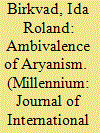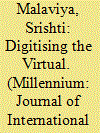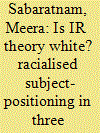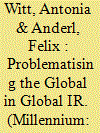|
|
|
Sort Order |
|
|
|
Items / Page
|
|
|
|
|
|
|
| Srl | Item |
| 1 |
ID:
176020


|
|
|
|
|
| Summary/Abstract |
How do historical ideas of global, supremacist connection exist alongside ideas of civilisational and racial difference? And what enables certain reactionary, political alliances to traverse colonial hierarchies of power? With an onset in contemporary, transnational connections between a Hindu and a Western Right, this article offers a critical genealogical reading of the concept of Aryanism. Understanding it as articulated historically through interactions between British colonialists and upper-caste Hindus in India, this reading focuses on these elites’ intersecting and contradictory ideas of hierarchy, difference, and cross-civilisational connection. Tracing the empirical, theoretical and political implications of these entanglements, the article contributes to on-going discussions on the imperial roots of conceptual formations and knowledge production in postcolonial International Relations.
|
|
|
|
|
|
|
|
|
|
|
|
|
|
|
|
| 2 |
ID:
176021


|
|
|
|
|
| Summary/Abstract |
This article offers a relational analysis of the use of armed drones in the ‘war on terror’. Drawing from Erin Manning’s writings on movement, relations, and the posthuman, I explore how bodies and spaces are read as digitised data in the processes of the drone assemblage, reducing movement to displacement and undoing relations of becoming. The drone’s violence lies in its crippling of bodies’ capacity to respond to their immediate environments and relations. The point of departure for this article is the concept of the ‘virtual’ as drawn out by Manning: the indeterminate potential of movement which moves bodies and relations. My analysis revisits the transcripts of Uruzgan drone attack in Afghanistan in 2010, a case that has been extensively studied in the critical literature on drones to offer conceptions of what it means for the drone to be a posthuman entity. Instead of situating the drone as a posthuman object, I examine it from a posthuman methodology where the focus is on relations, rather than determinate actors or outcomes. My intervention here is twofold: to propose a framework for understanding the drone’s violence in its processes of disrupting and undoing relations, and relatedly to argue for the methodological and theoretical value of the posthuman.
|
|
|
|
|
|
|
|
|
|
|
|
|
|
|
|
| 3 |
ID:
176018


|
|
|
|
|
| Summary/Abstract |
Racism is a historically specific structure of modern global power which generates hierarchies of the human and affirms White supremacy. This has far-reaching material and epistemological consequences in the present, one of which is the production and naturalisation of White-racialised subject positions in academic discourse. This article develops a framework for analysing Whiteness through subject-positioning, synthesising insights from critical race scholarship that seek to dismantle its epistemological tendencies. This framework identifies White subject-positioning as patterned by interlocking epistemologies of immanence, ignorance, and innocence. The article then interrogates how these epistemological tendencies produce limitations and contradictions in international theory through an analysis of three seminal and canonical texts: Kenneth Waltz’s Theory of International Politics (1979), Robert Keohane’s After Hegemony (1984) and Alexander Wendt’s Social Theory of International Politics (1999). It shows that these epistemologies produce contradictions and weaknesses within the texts by systematically severing the analysis of the international system and the ‘West’ from its actual imperial conditions of possibility. The article outlines pathways for overcoming these limitations and suggests that continued inattention to the epistemological consequences of race for International Relations (IR) theory is intellectually unsustainable.
|
|
|
|
|
|
|
|
|
|
|
|
|
|
|
|
| 4 |
ID:
176019


|
|
|
|
|
| Summary/Abstract |
International Relations (IR) has long been criticised for taking a particular (Western) experience as basis for formulating theories with claim to universal validity. ‘Non-Western’, ‘post-Western’, and postcolonial theories have been criticising the problem of Western parochialism and have developed specific strategies of changing IR. Global IR has taken up some of these concerns and aims at changing the discipline by theorising international politics as multiplex, taking different experiences, histories, and agencies into account. Yet, we argue that this agenda rests on a partial reading of IR’s critics, failing to take seriously the epistemological and methodological critiques of IR and therefore perpetuating some of the discipline’s ‘globalisms’. Therefore, first, Global IR reifies the idea of a truly universal body of knowledge. The global is logically prior to this as an imagined space of politics and knowledge. Second, Global IR assumes that scholars around the world aspire and are able to contribute to a single body of knowledge. While reifying these globalisms, Global IR fails to ask where this global imaginary comes from and what its effects are on the distribution of power and wealth. We argue that instead of assuming ‘the global’ as descriptive category, a more substantial and reflexive critique of IR’s exclusionary biases should start from reconstructing these globalisms and their effects.
|
|
|
|
|
|
|
|
|
|
|
|
|
|
|
|
| 5 |
ID:
176022


|
|
|
|
|
| Summary/Abstract |
Research across several disciplines has focused on the intersection between the international and the urban to shed light on transformations in global politics. Recently, this intersection has become the focus of critical International Relations scholars. Despite transversal interest, disciplinary boundaries often limit the scope of academic debate. In the interest of developing a transdisciplinary research agenda, this review article charts three different ways that scholars have theorised the relationship between the international, the urban, and the political across disciplines. A review of five recently published books, situated within a broader study of the literature, serves to do this.
|
|
|
|
|
|
|
|
|
|
|
|
|
|
|
|
|
|
|
|
|